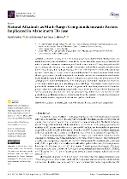Natural Alkaloids as Multi-Target Compounds towards Factors Implicated in Alzheimer's Disease

Publication date
2023Published in
International Journal of Molecular SciencesVolume / Issue
24 (5)ISBN / ISSN
ISSN: 1661-6596ISBN / ISSN
eISSN: 1422-0067Metadata
Show full item recordCollections
This publication has a published version with DOI 10.3390/ijms24054399
Abstract
Alzheimer's disease (AD) is the most common cause of dementia in elderly people; currently, there is no efficient treatment. Considering the increase in life expectancy worldwide AD rates are predicted to increase enormously, and thus the search for new AD drugs is urgently needed. A great amount of experimental and clinical evidence indicated that AD is a complex disorder characterized by widespread neurodegeneration of the CNS, with major involvement of the cholinergic system, causing progressive cognitive decline and dementia. The current treatment, based on the cholinergic hypothesis, is only symptomatic and mainly involves the restoration of acetylcholine (ACh) levels through the inhibition of acetylcholinesterase (AChE). Since the introduction of the Amaryllidaceae alkaloid galanthamine as an antidementia drug in 2001, alkaloids have been one of the most attractive groups for searching for new AD drugs. The present review aims to comprehensively summarize alkaloids of various origins as multi-target compounds for AD. From this point of view, the most promising compounds seem to be the beta-carboline alkaloid harmine and several isoquinoline alkaloids since they can simultaneously inhibit several key enzymes of AD's pathophysiology. However, this topic remains open for further research on detailed mechanisms of action and the synthesis of potentially better semi-synthetic analogues.
Keywords
Alzheimer's disease, plant alkaloids, marine alkaloids, multi-target compounds
Permanent link
https://hdl.handle.net/20.500.14178/2083License
Full text of this result is licensed under: Creative Commons Uveďte původ 4.0 International







